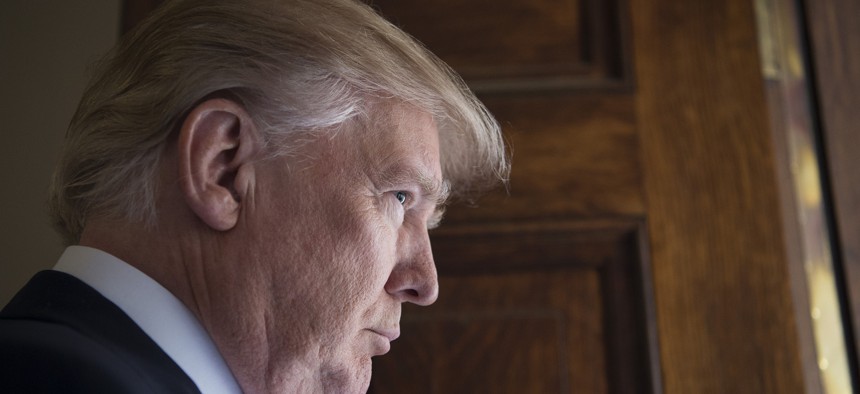
Tech. Sgt. Brigitte N. Brantley/Air Force
What We Know About Trump's 'Tapes' Tease
If they exist, the Secret Service doesn’t have them, and the president still isn’t ready to talk about them.
It’s the biggest mystery in Washington—or the biggest tease.
Is there a taping system at the White House, did it catch the conversations between President Trump and his ex-FBI director, James Comey, and if the answers to those questions are yes, will the president make the tapes public?
The Secret Service added one small piece to the puzzle on Monday when it told the Wall Street Journal that if there are tapes, it doesn’t have them. That is significant because the Secret Service handled the White House recording systems for previous presidents, including John F. Kennedy and Richard Nixon. The agency’s response, provided to the Journal through a Freedom of Information Act request, still allows for the possibility that another government entity—or perhaps Trump’s team itself—is managing a recording system. It was the president who launched this whole guessing game exactly one month ago with a tweet warning that Comey “better hope there are no ‘tapes’” before he starts “leaking to the press.” The ousted FBI chief ignored the threat, and in fact, he told the Senate intelligence committee last week that Trump’s tweet about tapes prompted him to give his now-famous memos to Columbia law professor Daniel Richman with instructions to leak them to reporters. “Lordy, I hope there are tapes,” Comey said during his testimony. “The president surely knows if he taped me. If he did, my feelings won't be hurt. Release all the tapes. I’m good with it.”
Trump isn’t ready to release them, or even to confirm whether they exist. He said at a Friday press conference that he would tell reporters about it “in a very short period of time.” On Sunday, a member of his legal team, Jay Sekulow, narrowed that window down to “next week.” And on Monday, the White House offered no further clarity on the question. Trump “will have an announcement shortly,” is all that Sean Spicer, the press secretary, would say on the topic.
Any recordings or transcripts of the Trump-Comey talks could clear up which man is telling the truth—the lawman who testified under oath that the president asked for his loyalty and voiced “hope” that he would let go of the FBI’s criminal investigation of Michael Flynn, or the president who claimed that he didn’t. Trump has indicated that he, too, is willing to testify under oath about his side of the story, but it’s not clear when, or whether, Republicans on Capitol Hill or the special counsel, Robert Mueller, will take him up on the offer.
The problem for the president is that reporters are no longer the only people seeking the tapes. The Republican and Democratic leaders of the House Intelligence Committee has given the White House counsel, Don McGahn, until June 23 to tell them whether there are any “recordings or memoranda” of the president’s conversations with Comey and to produce them if they exist. And both Senators Susan Collins of Maine, a Republican, and Dianne Feinstein of California, a Democrat, on Sunday issued their own calls for the president to dispense with the vague hints and hand over what, if anything, he had. It isn’t known whether the special counsel, Robert Mueller, has made a similar request of the White House, but if he is investigating whether Trump committed obstruction of justice, he’d surely want them, too.
Knowing Trump, the case for there not being tapes greatly outweighs the case for their existence. This is a man who repeatedly claimed to have evidence that his predecessor had falsified his birth certificate, but never offered any. And during his campaign and since he’s taken office, Trump has promised plans and timelines that have never materialized.
When it comes to tapes, even the president seems to be preaching skepticism. As he told reporters on Friday, “You’re going to be very disappointed when you hear the answer.”






